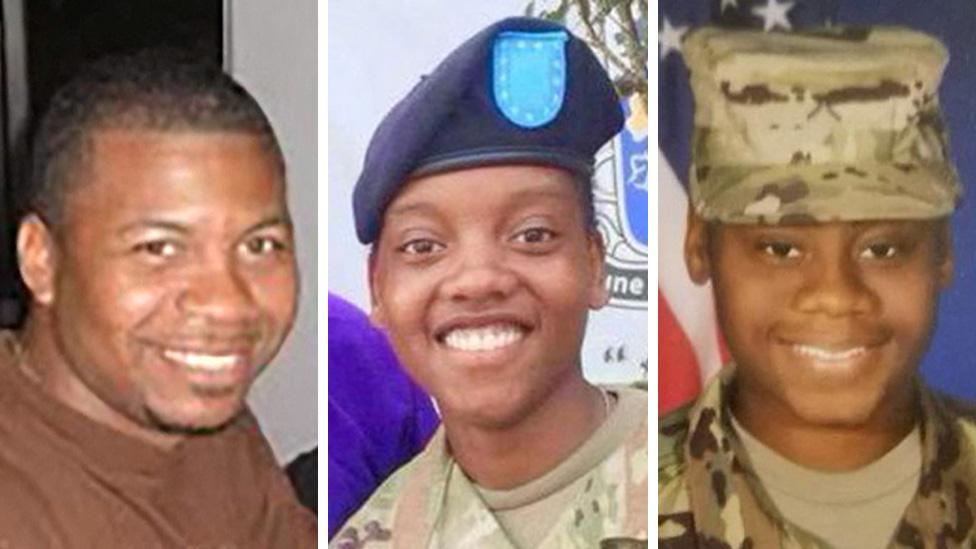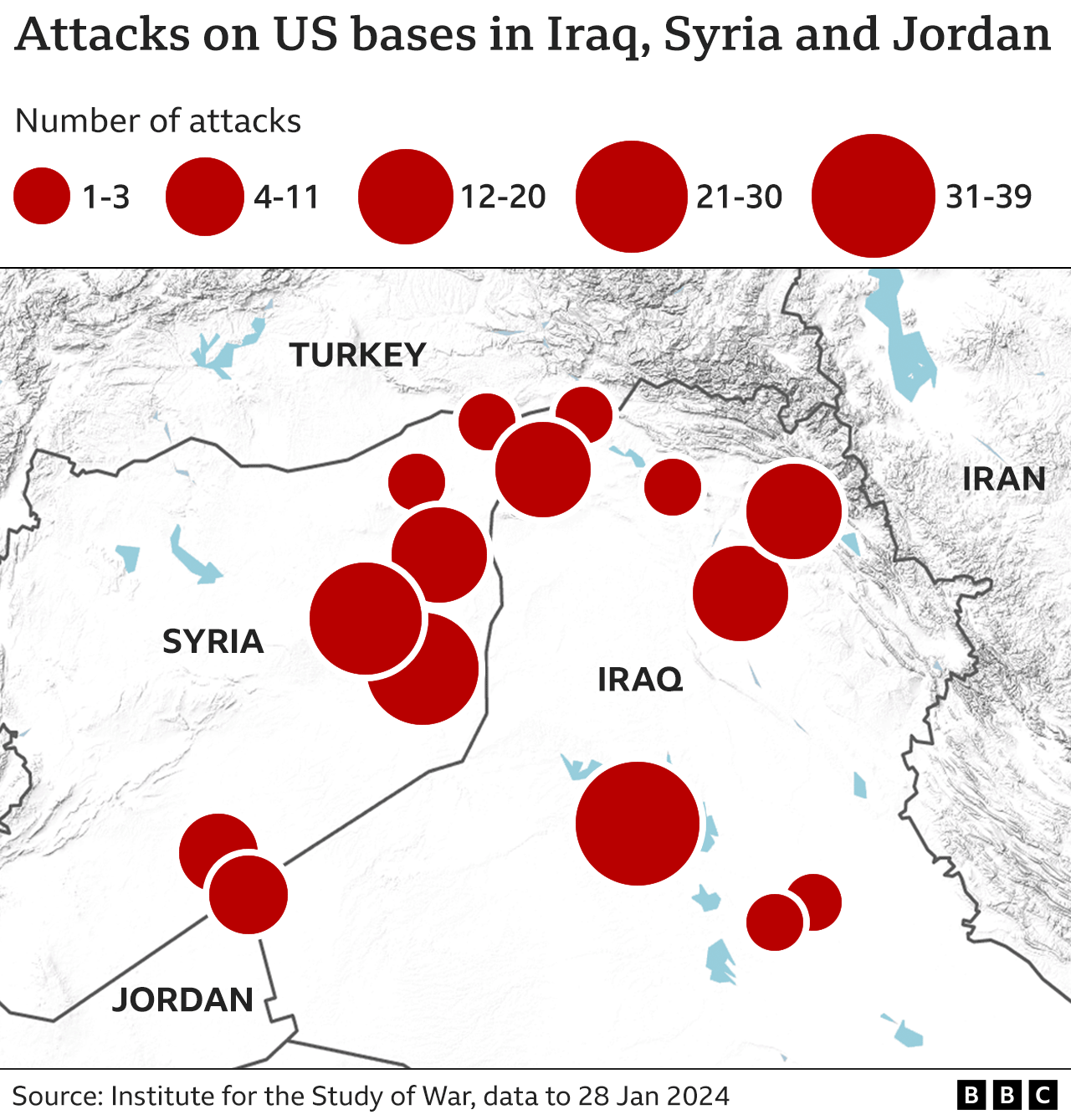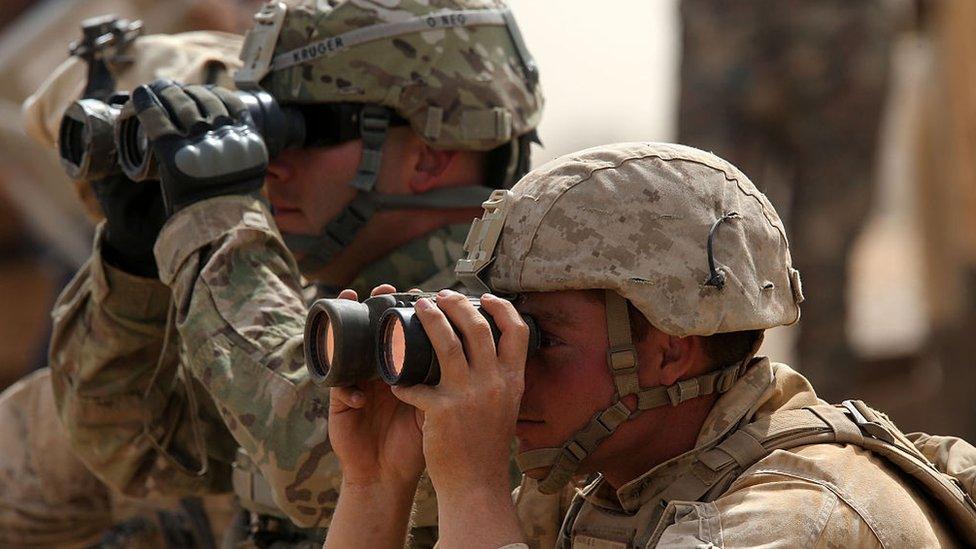Biden says he has decided US response to Jordan attack
- Published
Watch: Biden tells press he has decided on a response to the drone attack in Jordan
President Joe Biden says he has decided how the US will respond to a drone strike that killed three American troops in Jordan at the weekend.
Mr Biden did not elaborate in his remarks at the White House, but added: "I don't think we need a wider war in the Middle East."
An Iran-backed militia group has claimed responsibility for the attack at a US military base.
Dozens more were injured in Sunday's strike near the Syrian border.
The overnight drone attack was the first time US soldiers were killed by enemy fire in the Middle East since the Israel Gaza war erupted on 7 October.
Asked by reporters on Tuesday morning if he had decided how to respond to the attack, Mr Biden said: "Yes."
He was also asked if Iran should be blamed. "I do hold them [Iran] responsible in the sense that they're supplying the weapons to the people who did it," he said.
Iran has denied any involvement.
Watch: Parents of US soldiers killed: 'I'm still in shock'
White House National Security Council spokesperson John Kirby said the US might take a "tiered approach" in its response.
"Not just a single action, but potentially multiple actions... over a period of time," he told reporters on board Air Force One for Mr Biden's trip to attend election fundraisers in Florida.
"The guiding principle is making sure that we continue to degrade the kinds of capabilities that these groups have at their disposal to use against our troops and our facilities," he said.
Mr Kirby added: "The president will do what he has to do to protect our troops and our facilities and to look after our national security."
The president has a number of options, including retaliatory strikes on Iran-allied bases and commanders.
The US could also target senior commanders of Iran's Islamic Revolution Guard Corps in Iraq or Syria.
In recent months, several US bases in the Middle East have been attacked by militias trained, funded and equipped by Iran.
The Islamic Resistance in Iraq - which is made up of several Iran-affiliated militias operating - has claimed responsibility for Sunday's strike.

Sergeant William Jerome Rivers, 46, Specialist Kennedy Ladon Sanders, 24 and Specialist Breonna Alexsondria Moffett, 23
It has also said it mounted other attacks against US forces in recent weeks.
Kataib Hezbollah, an armed faction of the Islamic Resistance, said on Tuesday it would suspend all its military operations against US troops in the region to avoid "embarrassment" for the Iraqi government.
The weekend's deadly strike in north-eastern Jordan hit an American military base known as Tower 22.
About 350 US forces are stationed at the facility, which US Central Command says is focused on defeating the Islamic State group.
The strike killed Sgt William Jerome Rivers, 46, Specialist Kennedy Ladon Sanders, 24, and Specialist Breonna Alexsondria Moffett, 23.
More than 40 others were wounded, including 34 people who officials say were evaluated for possible traumatic brain injuries.
The White House said on Tuesday Mr Biden had spoken with the family members of the three troops.
The president will attend the "dignified transfer" of their bodies at Dover Air Force Base in Delaware on Friday, the national security spokesman told reporters.
Mr Biden told the families "how proud we all are of their service, how we mourn and feel sorrow over their loss", Mr Kirby said.
The enemy drone struck while an American drone was returning to the base from a mission.
Officials say the base's air defence auto-response features were turned off to avoid shooting down the US drone.
But because of that, there was no warning for troops who were reportedly still in their sleeping quarters.
A supplementary air defence system, called the Coyote, is being sent to Tower 22 to help intercept drones, the BBC's US partner, CBS News, reported.
Tower 22's air defences were not as robust as those of other bases in the region, an unnamed official said.

- Published29 January 2024
